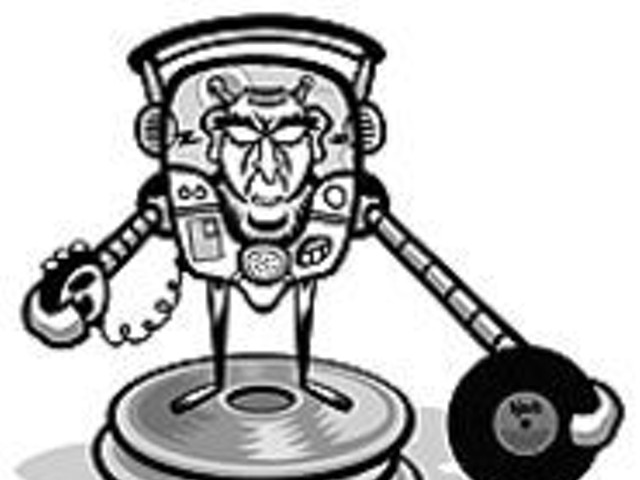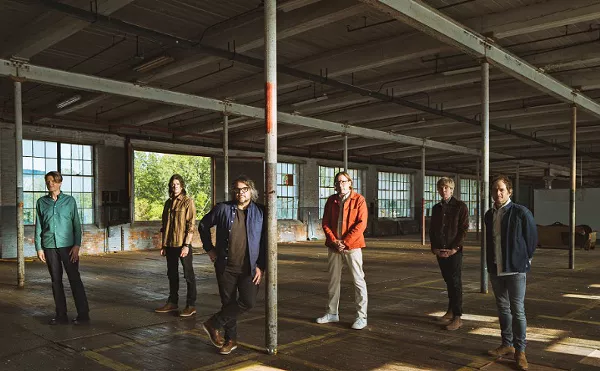1999 surely must rank with 1961 and 1974 as nadirs in pop-music history. Beset on one side by simpering middle-school goo and on the other by charmless metal-rap, discerning ears everywhere were forced to face the fact that we are living in a dark, dark time. The year's best big hit -- Fatboy Slim's "Praise You" -- actually came out in 1998. Even acts that did something worthwhile toiled without honor; the forces of good taste are scattered and confused. (JT)
Some critics seem to be suspicious of pleasure, especially if that pleasure is at all aligned with the taste of the masses. My favorite albums in 1999 -- the Barkers' Burn Your Piano, Wilco's Summerteeth and the Continental Drifters' Vermillion -- received little notice by either the press or the public. However, this year found more great singles on the radio than I've heard in some time.
The age-old themes of sex and dancing and bragging and begging and the experience of being alive were all over the airwaves. There was Kid Rock screaming his name at the top of his lungs before he rapped a litany of his own thrills in "Bawitdaba." There was Ricky Martin transferring power chords to his lungs on the hook-filled, Latin-rhythmed "Livin' La Vida Loca." There was Tal Bachman conjuring up the spirit of Todd Rundgren with the delightfully melodic "She's So High." (SP)
1999 was the year in which buying music once again became an overwhelming passion and navigating Web sites and record stores, debit card cocked, became totally exciting once again. Though there's no denying the glory of waltzing into a record store and discovering something in a rack, the online record store puts every single release out there available with a click -- a music geek's wet dream (or worst nightmare). Every order was a new revelation; every techno, blip-hop and hip-hop release created a new context; and, overall, the promise of computer-based music became an overwhelming reality. 1999 was the first year in my music-buying life in which the prominent instrument wasn't the guitar but the computer. And it's as exciting to be buying music as it was when I was 15 years old and snatching up punk 45s; the "here's three chords -- now go start a band" philosophy of punk has been overtaken by a new one: "Here's some software -- go crazy." So much amazing music out there, so many techniques, so much potential. (RR)
Electronica may be an apt sound for the turn of the century, but there's (we hope) a lot of future left. So when futuristic music becomes passé, what then? We're living in an era that's the musical equivalent of old science-fiction movies -- the ones that predicted a near-Jetsons environment by the year 2000. Or Disney World's Futureland, whose sloped, cliché-worn-structures sit rusting in obsolescence. When music is saddled with a makeshift futurism, not only does it become dated, there are no songs to remember later. Considering this, the millennium overchill makes me want to head for the genial hills of country music, among other fertile genres. (JO)
Nine hundred years ago, Hasan-i Sabbah, the founder of the mystical Assassins, claimed, "Nothing is true. Everything is permitted." Mr. Bungle seemingly created California to prove him right. They warp and weave the sticky tendrils of pop, noise and thrash-rock into a glistening mass of music that defies convention. If Burt Bacharach had gone to Woodstock and eaten the brown acid and then rewritten Pet Sounds as the soundtrack for a Jodorowsky sci-fi spy epic starring Christopher Walken as Barbarella, the resulting album would not be as spectacular as California is. Mr. Bungle unleash 10 songs that bear strange fruit and blossom into malodorous flowers of unearthly delights without the between-song skits and samples of their previous albums. Of the 10, "Pink Cigarette" stands out as the most fascinating. A love song, an empty threat, a suicide note -- whatever it is, "Pink Cigarette" captures the dark psychology of selfish devotion to another human being better than any excerpt from Monica's book or Jerry Springer's sideshow. (PF)
Best defiantly derivative sounds: Macy Gray's On How Life Is, Stereolab's Cobra and Phases Group Play Voltage in the Milky Night, Wilco's Summerteeth, Mandy Barnett's I've Got a Right to Cry and April March's Chrominance Decoder. Sometimes you've got to wonder: Shouldn't I be listening to something cutting-edge and difficult, maybe some electronica or turntablism or freaky bleating free jazz, something that looks ahead to the 21st century, not backward? The records listed above shamelessly cannibalize pop's canon, ripping off hooks and chord progressions and daring you to care. (You don't.) You can hear E.L.O. and Cheap Trick riffs all over the Wilco record, enlivened by Pet Sounds-era production flourishes. Barnett's creamy voice sounds like Patsy Cline's -- and Owen Bradley's luscious production doesn't hinder the illusion. Serge Gainsbourg and other luminaries of French '60s pop inform March's and Stereolab's efforts, also studded with glacial vintage synths and ba-ba-da vocal parts. The best songs on the debut of deliciously croaky Macy Gray sound like they're cribbed from Sly and the Family Stone or the Staple Singers. So what? Didn't the 20th century teach us that originality is an outdated virtue promoted by uncool Romantics? Are we suckers? Possibly. (RSS)
My favorite album this year only qualifies because of a belated U.S. release date. The Manic Street Preachers' This Is My Truth You Tell Me Yours is a spare, severe colossus, the smartest Big Rock record in a while. It was a huge hit everywhere but the United States, probably the only characteristic it shares with David Hasselhoff's musical output. (JT)
It's About Time Award: Goes to the hip-hop community, which finally realized full-force that the major-label system is a farce and that there's a way to thrive without lapping at the butt of The Man. The result was an avalanche of hip-hop CDs and LPs put out on tiny labels. Of course, the allure of getting paid may ultimately tempt many of these labels and artists to sign into the system. But for now, the indie hip-hop is the shit, the best of which was the incredible compilation The Funky Precedent, which featured the cream of the Left Coast crop: Jurassic 5 (who have already been scooped up by Interscope), Dilated Peoples, Styles of Beyond and the Beat Junkies. (RR)
Rest in Peace (and with music): Here are the ones with St. Louis-area roots whom I'll remember the most. Leon Thomas, who added his amazing vocals to the mu-sic of Pharoah Sanders, Santana and others. Lester Bowie, a great musi-cian with an even better sense of humor. Joan Bouise, who was born in New Orleans but left many musical memories for St. Louis friends and fans. Ernie Wilkins, an underappreciated trumpet great who added immensely to the big-band sounds of Count Basie, Dizzy Gillespie and Clark Terry. Then there were the people behind the scenes who added immense support to the music, such as Barbara Rose, who kept jazz alive at the Backstage Bistro, and Josephine Lockhart and Jim Randle, who were key to getting the worthy Crusaders for Jazz organization up and running. But Richard Henderson is still around to head up the Crusaders for Jazz and their efforts to provide a higher profile for local musicians and boost jazz-education efforts. And Gene Dobbs Bradford has stepped in for Rose as director for the Jazz at the Bistro without missing a beat. In fact, he's brought a new energy and broader range of jazz styles to the JAB performance series. (TP)
Some of my favorite songs were by people who knew the classic-pop rules and navigated them with precision and ease. "I Want It That Way" by the Backstreet Boys was a creamy-smooth confection of harmony, melody and rhythm. Sarah McLachlan scored with a couple of beautiful gems, "Angel" and "I Will Remember You." Fastball studied the songbooks of Crowded House and Elvis Costello and came up with "Out of My Head." Blondie added another masterpiece to its collection of catchy pop songs with "Maria." Cher made what sounded like the best Pet Shop Boys record in years, "Believe." Other songs covered new ground. Destiny's Child came up with "Bills Bills Bills," which took the clip-clop rhythms of Timbaland-inspired R&B and twisted them around a couple of deftly designed melodic hooks. Len sampled "More More More" by the Andrea True Connection and created something light and airy with "Steal My Sunshine." Santana combined the alt-rock vocals of Rob Thomas (from one of those bands I can't remember) with a sinuous Latin/R&B groove and his trademark guitar stylings to achieve "Smooth," probably the year's most irresistible single. (SP)
Q: If Kid Rock and the Backstreet Boys got into a fight to the death with pitchforks, who would win? A: Music lovers everywhere. (JT)
My inner curmudgeon is extremely disturbed that two songs I actually like, "Fly Away" by Lenny Kravitz and "All Star" by Smash Mouth, are also commercials. It never used to bother me when, say, Dr. John did a spot for a fast-food chain, but he was crooning, "Love that chicken from Popeye's," not devoting a brand-new song to hyping their Cajun spice. It just seems like, in 1999, another line was blurred between art and commerce, and no one seems to care (sniff).
That said, the year did produce some fine singles: Blink 182's "What's My Age Again," George Jones' "Choices," Everlast's "What It's Like," Macy Gray's "Do Something," Len's goofy "Steal My Sunshine" and Foo Fighters' "Learn to Fly." And, OK, two trend-driven songs, the Backstreet Boys' "I Want It That Way" and Kid Rock's "Bawitdaba" were also in heavy rotation in my brain. Hmm, and did I mention that Jennifer Lopez video? (DD)
I didn't expect much from Marshall Crenshaw's #447, which arrived nearly two decades after his best work. Bad prediction. One step out of a rut, Crenshaw has put his best foot forward. The album, produced with a homespun resonance, teems with some of the most hopeful, eloquent songs he's ever composed. That they're sometimes partitioned by twangy instrumentals takes nothing away from their impact. Most important, they should prove timeless and memorable through the years. In this overhyped, oversold millennium, I find myself drawn to music that behaves as though it's just another day. Or just another century. (JO)
Best evocation of Astral Weeks: "Pass in Time" from Central Reservation by Beth Orton (Arista). Vibes, double bass that sounds like a quadruple bass, acoustic guitar, dapples and swirls of a string section, the wild prayer of Orton's voice and the purest refrain: "Come now, come on now child, you're here just a while." (RK)
The overhyped, overrated album of the year? That's easy: Nine Inch Nails' The Fragile, which consists of the same angst-ridden song playing for two hours. Bart Simpson said it best on the "Homerpalooza" episode of The Simpsons: "Making teenagers depressed is like shooting fish in a barrel." (DD)
Best fucking-around-with-Americana: Trailer Bride's Whine de Lune and the Barkers' Burn Your Piano. (RSS)
Best Proof that There's Life in Them Old Rockers Yet: Elvis Costello backed by the Beastie Boys on Saturday Night Live's 25th anniversary. It's been about 20 years since SNL was new and exciting, and half as long since Costello buzzed and howled under the influence of heat, but at the tail end of an overlong, self-indulgent wankfest, Declan stepped up to the mic and re-created his own interrupted broadcast of "Radio, Radio" from SNL's glory days. The Beasties rushed the stage and played the part of the Attractions terribly, but it was the terrible that made punk great. They staggered through the song with zest and gusto, and when the instrumental break came, they teetered on the edge of falling apart, but Horowitz's one-finger keyboard technique somehow got everybody back on beat and they galloped to the finish line. Costello has been exploring lush melody and lyricism for years now, and his work with Burt Bacharach is either apogee or nadir, depending on where you stand: Isn't it about time he rediscovered the Attractions for an album or two? And aren't the Beasties due for a return to their punk-rock roots? Couldn't they release an album of power-pop gems instead of another hip-hop history lesson? Please? (PF)
Best reinvention of self: Far Away, Down on a Georgia Farm, Norman Blake (Shanachie). Blake might have called these spare instrumentals and desolate original folk songs Bergman's Bluegrass. Doc Watson's greatest inheritor, Blake has written and played in a lonesome vein before. Now he sounds as if time is running out and he's not about to let it off the hook. (RK)
I love music that's playful, that feels the urge to be mischievous. That's why I turned the radio up every time I heard Shania Twain's "That Don't Impress Me Much." It's full of sass, from the rhythm track on up to her vocal, especially when she stops the music to speak lines like "OK, so you're Brad Pitt" before revving up again to the title chorus line. Then there was Madonna's "Beautiful Stranger," from the Austin Powers soundtrack. This is Madonna, mind you, whose forte has always been contemporary dance music, singing a psychedelic, '60s-influenced pop song that wouldn't have been out of place on a Zombies record. (SP)
Most Unlikely (Yet Successful) Mack Daddy: Beck, whose Midnite Vultures, though ridiculous and derivative, was gloriously so. It's the best funk album of the year, a blast of party music crammed with whim and wham, drivel ("running buck wild like a concubine/whose mother never held her hand") and gold dust. This is the shit, filled with Paisley Park punch, West Coast bounce and Detroit dirt. Who cares that Beck's white and his music is black, that his pose is a bit too postmodern, that his funk is bunk? Pop this fucker on in a crowded room and step aside, Junior. The room lights up. Oh, and it also contains the nastiest/sexiest line George Clinton never wrote: "Keep your lamplight trimmed and burning!" Had I a lamplight to keep trimmed, it'd be burning for Beck. (RR)
Best old discovery: Os Mutantes, a Brazilian band from the '60s whose retrospective compilation CD Everything Is Possible disorients and delights. (RSS)
Best "This Is on a Major Label?" Record: Mexico City's Cafe Tacuba generously offered us the transcendent, genre-splitting double CD Reves/Yosoy. Released on Warner Bros., the damned thing is a study in sound, one of those records on which every song sounds like a different artist. Actually two records -- bound, it seems, only by the shrink wrap -- Reves is the more "accessible" of the two; it's got actual songs and singing on it, pop melodies and masterful hooks. Yosoy is the masterwork here, though, an instrumental excursion that moves from freaky acoustic examinations to electronic beat-based poundings to gorgeous string-quartet compositions (the best of which is performed by the Kronos Quartet). (RR)
Best Release by a Washed-Up Has-been: Neil Diamond's Neil Diamond Collection. For years, Neil has been tagged "the Jewish Elvis," but let's lay it on the line: Elvis never wrote a song in his life; he stank up the screen in a slew of terrible movies; and he was Michael Jackson's posthumous father-in-law. Neil, however, wrote a passel of great songs, only starred in one terrible movie and had nothing to do with Michael Jackson. So who's really the pretender here? Shouldn't Elvis be known as "the Gentile Neil Diamond?" It was Elvis, after all, who covered one of Neil's songs ("And the Grass Won't Pay No Mind"), not the other way around. "Grass" is included here, as are a bunch of Diamond classics. You get "Song Sung Blue," "Sweet Caroline" and his masterpiece, "I Am ... I Said." Laugh if you will, but stay up all night and then listen to "I Am ... I Said" when you're tired and alone and your defenses are down, and try not to cry, tough guy. You also get some pompous liner notes and some hot photos of Neil from his mid-'70s hair-farming days. Ah, it was a very good year. (PF)
Best overall achievement: The Magnetic Fields' 69 Love Songs. This sprawling, sordid three-CD spectacle aims high and doesn't disappoint, dissecting loves unrequited, loves defeated, loves virtual and real -- love as a language, all the glittering fraud and AM-radio poetry of it. Who but Stephin Merritt would care enough to indulge in the exercise 69 times? Who else could reference Ferdinand de Saussure and Holland-Dozier-Holland in the same song? (RSS)
There were the retro-rock stylings of Lenny Kravitz on "Fly Away," and Counting Crows with "Hangin' Around." There were the classic, pump-up-your-fist-as-if-we-never-went-away riffs and hooks of Def Leppard's "Promises." There was the soaring melody of the Red Hot Chili Peppers' "Scar Tissue." There was the hard-rock/'80s dance blend of Orgy's cover of New Order's "Blue Monday." There was the ultimate bounce of Jay-Z's "Can I Get A ..." There was the lighthearted, wispy "Kiss Me" by Sixpence None the Richer (the same wispiness that failed them on their cover of the La's "There She Goes"). (SP)
Most exquisite genre blur: "Time After Time" from Traveling Miles, Cassandra Wilson (Blue Note). In his late performances, Miles Davis frequently offered up a version of Cindy Lauper's ubiquitous hit. Wilson is the only singer alive who can do with her voice what Davis did with his horn: In the deepest secret of a hushed lyricism, pop and blues and country and soul and jazz really are one. (RK)
Most persuasive argument for the existence of God: Speaking in Tongues, David Murray (Justin Time). Murray has worked with St. Louis R&B and gospel legend Fontella Bass before: Her voice graces the World Saxophone Quartet's funkiest album, Breath of Life. Here, Murray and Bass collaborate more fully, finding the occult and holy place where contemporary gospel and free jazz speak a single, irresistible language. (RK)
No one could match the power and intensity of Rage Against the Machine's The Battle of Los Angeles, my fave of the year by a large margin. Coming the closest, though, were the Flaming Lips' The Soft Bulletin and Moby's Play. Equally great in a far different direction were Steve Earle and the Del McCoury Band's The Mountain and George Jones' Cold Hard Truth. On the dance tip, Basement Jaxx led the way with the ridiculously catchy Remedy. Rounding out my Top 10 are Fountains of Wayne's Utopia Parkway, Wilco's Summerteeth, Tom Waits' Mule Variations, and Taj Mahal and Toumani Diabate's Kulanjan, a beautiful journey of American blues back to its African roots. (DD)
Matthew Smith was in an underrated country-rock band called the Volebeats. This year his own group, Outrageous Cherry, pushed the pop envelope with Out There in the Dark. Murky, feedback-laced and catchy, the album filters White Light/White Heat through Rubber Soul. It's not a masterpiece, but it is good cutting-edge pop. So is Matthew Sweet's In Reverse, though it will do little to make people forget Girlfriend, an album with which Sweet has been unable to break up, artistically or critically. (JO)
Best teenage-sex songs: local phenom Sullen's "Cracked Code" and hussy-of-the-moment Christina Aguilera's "Genie in a Bottle." Interesting fact: Both these songs are performed by very blond young women barely out of their teens. Aguilera is a former Mouseketeer with a lot of smoky charcoal eyeliner and a winning way of jerking her pudendum as she sings lines such as "Oh! My body's sayin' let's go, go ... but my heart's sayin' no, no." She grunts and undulates, bosses and exclaims. I don't blame 11-year-old girls for worshiping her. Who wouldn't? Shanna Kiel of Sullen plays great filthy, fuzzed-out guitar on the Breeders-meets-Nirvana confection "Cracked Code," all the while squealing adorably about the many orgasms she plans to have: "I'm fueled on sex and Vaseline!" Swagger on, sisters! (RSS)
Most appalling record of the year, if not the decade: Andre Williams and the Sadies' Red Dirt (Bloodshot). When your most memorable hook is "She's all that and a bag of potato chips," you know you're in trouble. And country and funk should never be played by a barely competent instrumental surf band. (RK)
The tired old punk and ska scenes rallied to produce a few records of lasting merit. The Strike delivered a solid, moving hard-pop LP with Shots Heard 'Round The World, although it doesn't quite match their debut of a few years ago. The addition of horns was a nice touch, though, and the left-wing lyrics are as stirring as the revolutionary cover artwork. Another socialist band, the Adjusters, gave us a cracker of an album called Before the Revolution, ably mixing the best organic dance genres of the past 40 years. They manage to play ska, soul, reggae and Latin without sounding like a crappy cover band. Best of all was Dillinger Four's This Shit Is Genius, a collection of their singles that shows the kids where to go next with the hard-fast-loud blueprint.
So, 1999 -- a year in which the best records were made by socialists. It just goes to show you: When capitalism is killing music and even one revolution per minute would help, turn left. You have nothing to lose but your Spears. (JT)
Best new discovery: Puerto Muerto, who recently relocated from St. Louis to Chicago, leaving our local music scene poorer and sadder as a result. We wish them well with the new CD they're finishing up, but we warn all other good local bands to stay put or face our wrath. (RSS)
The only major negative for jazz this past year was the untimely demise of radio station KZJZ on the AM dial. Led by Maria Keena and a group of music-savvy DJs, the station won the coveted National Association of Broadcasters' 1999 Marconi Radio Award as Best Jazz Station. Unfortunately, Keena had virtually no marketing budget to work with, and as a result, the station had a tough time gaining sponsors. But it was still the most interesting jazz station in town while it was here. (TP)
I'm glad that vinyl survives in the age of digital oppression, but I don't consider 12-inch records musical instruments. Therefore I conclude that 1999's worst trend is the way remix maestros, sampling wizards and, particularly, club DJs are worshiped like (as?) musicians. Sure, some of these cats know how to reheat and stir classic platters -- free samples, anyone? -- but their deification trivializes the importance of songwriters and players. I enjoy its best exemplars, but most programmed trip-hop, spaced-out dance dirges and diluted remixes blur together, making '80s synth-pop sound like Beethoven by comparison. (JO)
Best Sample: Future Pilot A.K.A. is a guy who used to be in Brit Buzzcock ripoff band the Soup Dragons. He's ditched that gig and moved into the computer world, and on his debut double CD as the Future Pilot, he and remixer Suckmonster sneak into the Pharoah Sanders catalog and pull out the glorious "Japan" from Tauhid. The original is a beautiful meditation, and, believe it or not, the Future Pilot makes it more beautiful. The entirety of the Pilot's Vs. A Galaxy of Sound is great: soft and hard trip-hop and subtle electronica for the cerebral and the stoned. (RR)
History Lesson, Part 1: Carl Craig's Planet E label out of Detroit has been churning out techno and house revolutions every year for the past six or seven, and said revolutions are collected on Geology, a nearly perfect snapshot of their sound. (RR)
Best ways to kiss the 20th century goodbye: Freakwater's ragged and radiant, bleak and beautiful End Time and Sally Timms' prettily perverse Cowboy Sally's Twilight Laments for Lost Buckaroos. (RSS)
Most unlikely elegy: "Carter" from Fifty Odd Dollars, Fred J. Eaglesmith. A Canadian singer/songwriter and rocker gets into the head of Ralph Stanley. He imagines what it's like to take the wheel of an Airstream bluegrass-tour bus and carry on for four decades after his brother, best friend and God's own singer, Carter Stanley, drank himself to death. It couldn't work, but it breaks your heart that it does. (RK)
The most promising development on the local jazz scene in 1999 was the growth of St. Louis-based jazz labels. Richard McDonnell's MAXJAZZ label gained national notice for its series of four vocal CDs -- two of which featured Christine Hitt and Asa Harris, who were mainstays on the St. Louis scene for years. The new Gaslight Records label was founded by Dan Warner of Webster Records, with a debut live recording of the Ralph Sutton Trio at the Jazz at the Bistro. And although the Catalyst label is based in Indiana, its first two releases have featured Willie Akins and Jeanne Trevor. (TP)
Best resurrection: Buena Vista Social Club Presents Ibrahim Ferrer, Ibrahim Ferrer (World Circuit). On the back of the CD is a photo of this heretofore-unknown singer -- a male, Cuban reincarnation of Billie Holiday -- lost in a dream beneath a frozen clock. That's what this record is like. (RK)
Best reason to wish that critics who've made careers out of indiscriminately slogging mainstream country music will one day have a hard time finding their own asses with two hands, a mirror and a blowtorch: Under the Influence, Alan Jackson (Arista). With all due respect to the Waco Brothers, and despite what nearly every paper or magazine of record says, there's more to Nashville than the satanic mills that Garth and Shania built. Like no other country or alt-country artist to emerge in the '90s, Jackson knows how to sing a honky-tonk number. On this suite of familiar and obscure '50s and '70s country songs, his graceful phrasing, plangent tone and unassuming (and honest) working-class instincts are put to militant and moving purpose. When he takes on Gene Watson's "Farewell Party," one of the most transcendent songs in country-music history, you know what you're hearing -- even if you can't believe anyone would take such a risk and triumph so well. (RK)
Experience has taught me that I probably won't hear the best record of any given year until the year after, possibly later. Maybe I won't even find out about the real best-of-the-year release until I see it on someone else's list. Maybe I'll never hear it at all. Everyone's in the same predicament, of course, but most people who compile these lists don't care. They shrug off these neurotic concerns, figuring they've heard a lot -- maybe not everything, but a significant percentage -- and besides, nobody takes these things seriously anyway. (RSS)





